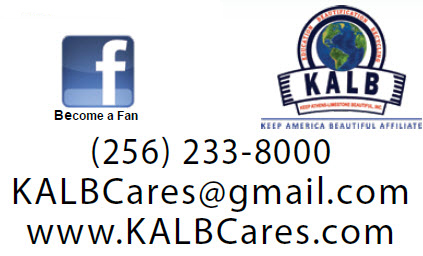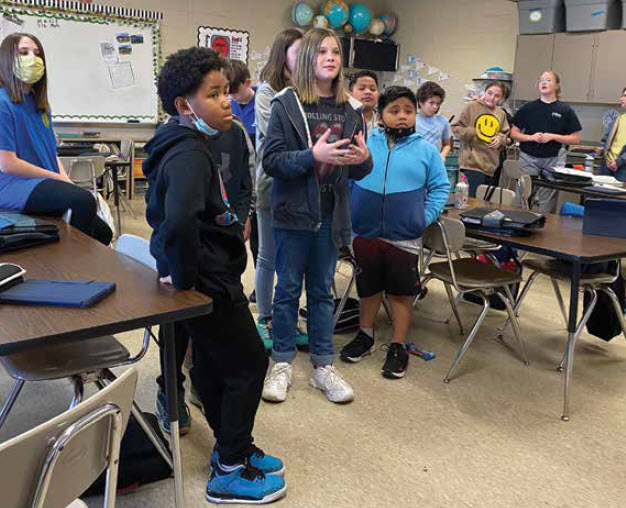 By: Leigh Patterson
By: Leigh Patterson
Education is one of our main focuses here at Keep Athens-Limestone Beautiful. One of my favorite things to do is to go into all 5th grade and some 6th grade classes in Limestone County Schools and Athens City Schools to teach them about litter, recycling, and other environmental issues. It is so important to teach the next generation how to care for the world around us.
Each school year, we go into all of these classrooms with the Limestone County 4-H program as their guest speaker. We begin during the month of November and finish up during the month of February. For the last several years, we have been playing Jeopardy with the students, and each year we rotate the topics between Environmental Issues and Recycling, to keep from repeating the same program each year. This year’s topic was Environmental Issues and the categories were Litterbugs Me, The 3 Rs, Birds Bees and Butterflies, It’s A Wildlife, Let’s Talk Trees, and Living Together.
The students really enjoy playing the game. We divide them up into teams and watch their competitive spirits come alive! They also learn things that they may not have heard or thought about before. Most of the time, the students are able to answer the questions after thinking them through (and maybe with just a little bit of help).
Just for fun, here a few of my favorite questions that are asked during the game, along with the answers. Do you know the answers? Are you smarter than a 5th grader?
Can litter in Athens end up in the Elk or Tennessee River? Explain your answer.
Yes, because wind, water (rain), and wildlife can move litter great distances. Litter is carried through ditches and streams to the river, and can even reach as far as the ocean!
This question helps the students to understand that even though litter is thrown down in one place, it affects more than just the area where it is thrown or dropped. Litter moves! Littering in downtown Athens can potentially affect one of the sources of our drinking water, the Elk River, and can even reach the ocean, a fact that most do not consider.
Once an aluminum can is recycled, how long would it take to become a new can on the store shelf? 6 weeks, 3 months, or 6 months?
6 weeks! Once a can is recycled, it is sold, processed, and manufactured into a new can, and back on the shelf in 6 short weeks! What a waste to toss it in the trash!

Aluminum is a natural resource, and with this question, we help the students think about how important our natural resources are, and that we are saving unused resources by recycling what has already been processed. We also teach them about landfills, and how wasteful it is for aluminum and other recyclables to end up there. Everyone is always surprised at what a short time it takes for the aluminum to end up back on the store shelves!
Explain the meaning of the following Native American Proverb: We do not inherit the Earth from our ancestors, we borrow it from our children.
If we destroy our environment, we are taking away from future generations who will not have what they need. That is the definition of greed. We must do our best to preserve the Earth, not out of obligation, but as a gift we want to pass on to our children.
I believe that this question teaches the concept of being a good steward, and taking care of the world around us, so that it will be in better shape when we leave than how we found it. This includes being responsible in regards to littering, recycling, and how we use our natural resources.
We had a fun time in the classrooms again this year! Our hope is that the students came away with a little more knowledge about environmental issues that will help them make better decisions in their own lives moving forward. We are truly grateful for the opportunity that the Limestone County 4-H program provides to us in joining them each year.
By: Leigh Patterson
Executive Coordinator – Keep Athens-Limestone Beautiful






